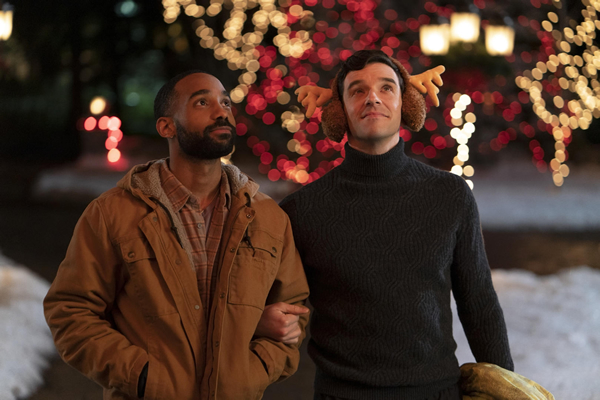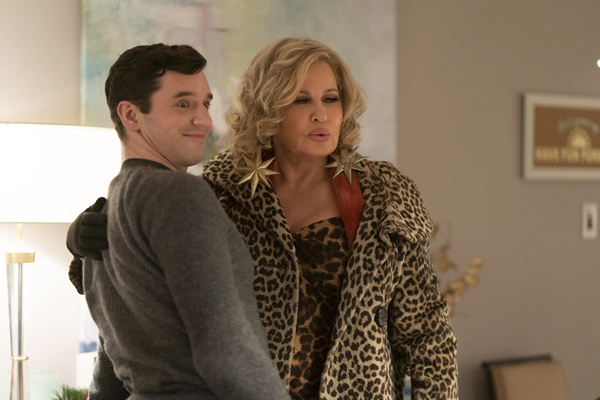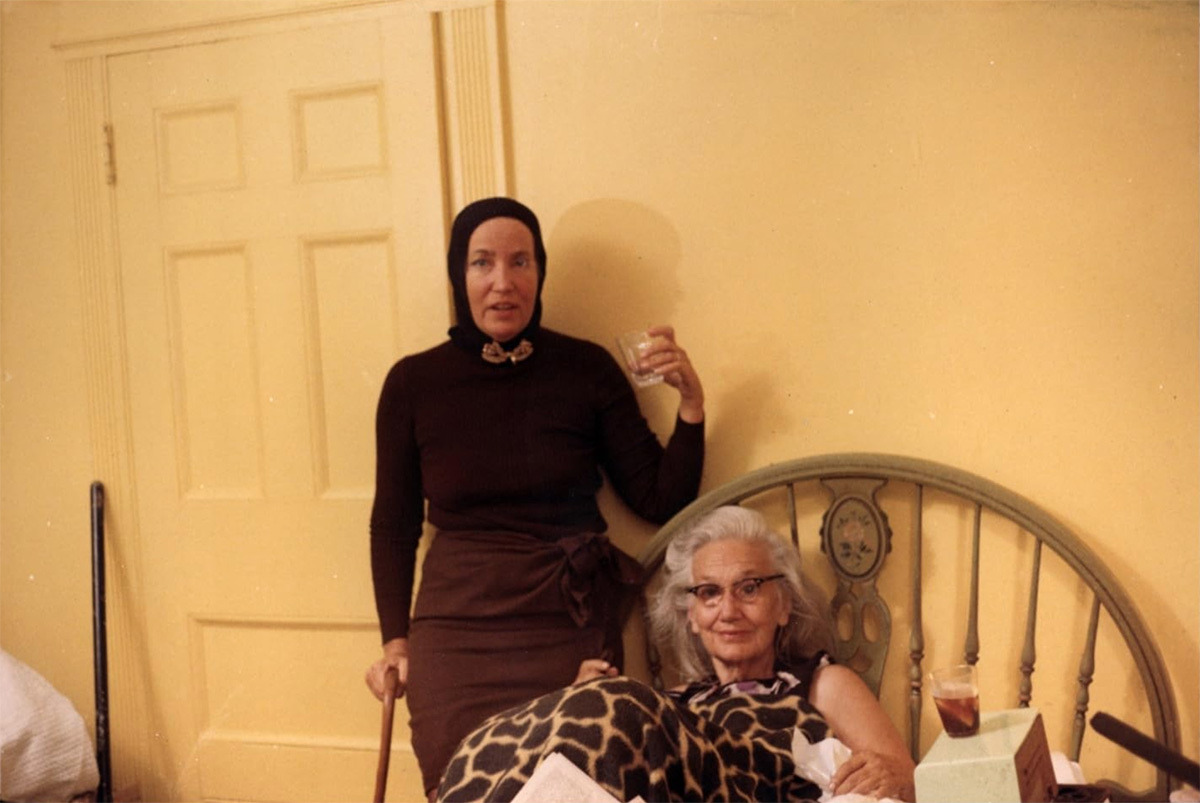Movies
Holiday movie and TV preview
Lesbian romance, ‘Rent’ adaptation, and Lady Gaga make the season bright

It wasn’t all that long ago – barely one or two Decembers ago, really – that the holiday lineup of movies and TV shows offered very little in the way of LGBTQ inclusion. It may have been the time of year to don our gay apparel, but the closest thing to gay representation we were likely to get on our screens was an elven dentist and a few misfit toys.
This year, however, is a different story. The seasonal entertainment landscape of 2021 brings with it the usual crop of mainstream (read: straight) crowd-pleasers with queer appeal (Lady Gaga as scheming real-life social-climber and Gucci murderer Patrizia Reggiani? Yes, please!), but it also comes bearing a much heftier-than-usual bag of gifts in the form of actual queer content, with actual queer characters and stories, and with some of our favorite stars. Not all of them are holiday stories, of course, but that doesn’t mean they don’t all make the season brighter – and the Blade is here to help you sort through the bounty with our annual Holiday Preview, a roundup of titles our readers will want to check out. The list is below:
tick, tick…BOOM! (Netflix and in theaters 11/ 19): Perfect for Broadway lovers, this is the hotly anticipated film adaptation of the posthumously produced autobiographical musical by Jonathan Larson, who revolutionized musical theater as the creator of “Rent” but died suddenly of an aortic dissection at 35 before he could see it grow to a global phenomenon. The film follows the young theater composer – played by Andrew Garfield – as he struggles to write what he hopes will be the next great American musical while waiting tables in a NYC diner, dealing with pressures in his personal life, and watching the artistic community around him be ravaged by the ongoing AIDS crisis. Fittingly enough, this hotly anticipated film about a Broadway giant is the feature directorial debut of another Broadway giant – none other than “Hamilton” and “In the Heights” creator Lin-Manuel Miranda, himself. Written by Tony-winner Steven Levenson (“Dear Evan Hansen”), it also stars Alexandra Shipp, Robin de Jesús, Joshua Henry, Mj Rodriguez, Bradley Whitford, Tariq Trotter (aka Black Thought of The Roots), Judith Light, and Vanessa Hudgens.
House of Gucci (In theaters 11/24): As mentioned above, this tale of true crime and high fashion stars LGBTQ ally Lady Gaga, and it’s already been called “disappointing” by the real-life Gucci family – so you know it’s going to be juicy. Inspired by the shocking true story of Patrizia Reggiani (Gaga), whose marriage into the family behind the Italian fashion house takes center stage as the film chronicles three decades of love, betrayal, decadence, revenge, and ultimately murder. Directed by multiple Oscar-nominee Ridley Scott, this sure-fire award season contender also stars Adam Driver, Jeremy Irons, Salma Hayek, Al Pacino, Reeve Carney, and an unrecognizable Jared Leto as Paolo Gucci.
The Humans (Showtime and in theaters 11/24): Another import from the Broadway stage, this seasonally appropriate adaptation of Stephen Karam’s Tony-winning drama centers on a dysfunctional NYC family as they help their youngest daughter Brigid (Beanie Feldstein) move into her new apartment with her boyfriend (Steven Yuen) on Thanksgiving Day. This sets the scene for a relatable – if occasionally uncomfortable – holiday dinner in which personal issues become fodder for discussion and family conflicts start rearing their ugly heads. More than just another cutting domestic drama for the holidays, this one goes deep to offer a slice-of-life observational commentary on the state of family life in America today. Amy Schumer co-stars as Brigid’s older lesbian sister Aimee, and Jayne Houdyshell reprises her acclaimed Broadway performance as the girls’ mother, in an ensemble cast that also features Richard Jenkins and June Squibb. Playwright Karam not only wrote the adaptation himself, but also directed, making his debut behind the camera and ensuring that this one is sure to be a must-see for fans of theater and film alike.
Saved by the Bell, Season 2 (Peacock TV 11/24): Peacock’s reboot of the classic ‘90s sitcom returns for a second round, and besides the obvious appeal in the camp and nostalgia departments, it also features a trans leading character portrayed by a trans actress. Populating the halls of Bayside High is a cast that includes Elizabeth Berkley Lauren, Mario Lopez, John Michael Higgins, Haskiri Velazquez, Mitchell Hoog, Josie Totah, Alycia Pascual-Peña, Belmont Cameli, Dexter Darden, Mark-Paul Gosselaar, Tiffani Thiessen, and Lark Voorhies (Lisa Turtle).
Single All the Way (Netflix 12/2): Yet another Tony-winner (Michael Mayer) directs this promising entry to the Holiday roster, Netflix’s first-ever gay-themed Yuletide romance starring Michael Urie (“Ugly Betty,” Broadway’s “Torch Song”) as a gay man who asks his best friend (Philemon Chambers) to pose as his boyfriend at his family’s Christmas dinner to avoid being questioned about his perpetually single status. Unbeknownst to him, his mom (Kathy Najimi) has already planned to set him up with her handsome personal trainer (Luke MacFarlane) – which obviously means that festive hijinks are sure to follow. This slice of seasonal sweetness also features Barry Bostwick (“The Rocky Horror Picture Show”) and Jennifer Robinson, and capping it off is the incomparable Jennifer Coolidge, rounding out her “White Lotus” year with what will undoubtedly be another mesmerizingly dotty performance in a supporting role.

The Bitch Who Stole Christmas (VH1 12/2): In the “why didn’t they do this sooner?” category is this holiday special from Emmy-winning TV icon and “Drag Race” legend RuPaul, who takes the screen as “a workaholic big-city fashion journalist” who (according to the show’s official description) goes on assignment to “a Christmas-obsessed small town” and “finds herself in the middle of cut-throat housewives, a high-stakes ‘Winter Ball’ competition, and a sinister plot that could destroy Christmas fore-evah!” Joining Mama Ru onscreen will be 20 “Drag Race” winners and a host of other celebrities. We’re there.
With Love (Amazon Prime 12/17): From Gloria Calderón Kellett, the critically acclaimed showrunner of the queer-inclusive reboot of “One Day at a Time,” comes Amazon Prime Video’s first holiday miniseries, complete with a heavily inclusive LGBTQ cast and queer storylines that feature a gay couple (played by Mark Indelicato and Vincent Rodriguez III) and one of the first transgender love stories ever to be found in a holiday rom-com. The series consists of five hour-long episodes tracking the Diaz family as they search for love and purpose across five different holidays during the year. Also starring are Emeraude Toubia, Desmond Chiam, Rome Flynn, Isis King, Todd Grinnell, Constance Marie, and Benito Martinez.
Under the Christmas Tree (Lifetime 12/19): Lifetime’s first-ever lesbian romance begins when “Christmas tree whisperer” Charlie Freemont (Tattiawna Jones) finds the perfect tree for the governor’s holiday celebration – in the backyard of marketing whiz Alma Beltran (Elise Bauman). The two women spar, naturally, but it’s not long before – with a little help from the tree and “some Christmas fairy dust” from the town’s resident pastry chef (Ricki Lake) – the romantic sparks begin to fly.
Movies
Radical reframing highlights the ‘Wuthering’ highs and lows of a classic
Emerald Fennell’s cinematic vision elicits strong reactions

If you’re a fan of “Wuthering Heights” — Emily Brontë’s oft-filmed 1847 novel about a doomed romance on the Yorkshire moors — it’s a given you’re going to have opinions about any new adaptation that comes along, but in the case of filmmaker Emerald Fennell’s new cinematic vision of this venerable classic, they’re probably going to be strong ones.
It’s nothing new, really. Brontë’s book has elicited controversy since its first publication, when it sparked outrage among Victorian readers over its tragic tale of thwarted lovers locked into an obsessive quest for revenge against each other, and continuing to shock generations of readers with its depictions of emotional cruelty and violent abuse, its dysfunctional relationships, and its grim portrait of a deeply-embedded class structure which perpetuates misery at every level of the social hierarchy.
It’s no wonder, then, that Fennell’s adaptation — a true “fangirl” appreciation project distinguished by the radical sensibilities which the third-time director brings to the mix — has become a flash point for social commentators whose main exposure to the tale has been flavored by decades of watered-down, romanticized “reinventions,” almost all of which omit large portions of the novel to selectively shape what’s left into a period tearjerker about star-crossed love, often distancing themselves from the raw emotional core of the story by adhering to generic tropes of “gothic romance” and rarely doing justice to the complexity of its characters — or, for that matter, its author’s more complex intentions.
Fennell’s version doesn’t exactly break that pattern; she, too, elides much of the novel’s sprawling plot to focus on the twisted entanglement between Catherine Earnshaw (Margot Robbie), daughter of the now-impoverished master of the titular estate (Martin Clunes), and Heathcliff (Jacob Elordi), a lowborn child of unknown background origin that has been “adopted” by her father as a servant in the household. Both subjected to the whims of the elder Earnshaw’s violent temper, they form a bond of mutual support in childhood which evolves, as they come of age, into something more; yet regardless of her feelings for him, Cathy — whose future status and security are at risk — chooses to marry Edgar Linton (Shazad Latif), the financially secure new owner of a neighboring estate. Heathcliff, devastated by her betrayal, leaves for parts unknown, only to return a few years later, with a mysteriously-obtained fortune. Imposing himself into Cathy’s comfortable-but-joyless matrimony, he rekindles their now-forbidden passion and they become entwined in a torrid affair — even as he openly courts Linton’s naive ward Isabella (Alison Oliver) and plots to destroy the entire household from within. One might almost say that these two are the poster couple for the relationship status “it’s complicated.” and it’s probably needless to say things don’t go well for anybody involved.
While there is more than enough material in “Wuthering Heights” that might easily be labeled as “problematic” in our contemporary judgments — like the fact that it’s a love story between two childhood friends, essentially raised as siblings, which becomes codependent and poisons every other relationship in their lives — the controversy over Fennell’s version has coalesced less around the content than her casting choices. When the project was announced, she drew criticism over the decision to cast Robbie (who also produced the film) opposite the younger Elordi. In the end, the casting works — though the age gap might be mildly distracting for some, both actors deliver superb performances, and the chemistry they exude soon renders it irrelevant.
Another controversy, however, is less easily dispelled. Though we never learn his true ethnic background, Brontë’s original text describes Heathcliff as having the appearance of “a dark-skinned gipsy” with “black fire” in his eyes; the character has typically been played by distinctly “Anglo” men, and consequently, many modern observers have expressed disappointment (and in some cases, full-blown outrage) over Fennel’s choice to use Elordi instead of putting an actor of color for the part, especially given the contemporary filter which she clearly chose for her interpretation for the novel.
In fact, it’s that modernized perspective — a view of history informed by social criticism, economic politics, feminist insight, and a sexual candor that would have shocked the prim Victorian readers of Brontë’s novel — that turns Fennell’s visually striking adaptation into more than just a comfortably romanticized period costume drama. From her very opening scene — a public hanging in the village where the death throes of the dangling body elicit lurid glee from the eagerly-gathered crowd — she makes it oppressively clear that the 18th-century was not a pleasant time to live; the brutality of the era is a primal force in her vision of the story, from the harrowing abuse that forges its lovers’ codependent bond, to the rigidly maintained class structure that compels even those in the higher echelons — especially women — into a kind of slavery to the system, to the inequities that fuel disloyalty among the vulnerable simply to preserve their own tenuous place in the hierarchy. It’s a battle for survival, if not of the fittest then of the most ruthless.
At the same time, she applies a distinctly 21st-century attitude of “sex-positivity” to evoke the appeal of carnality, not just for its own sake but as a taste of freedom; she even uses it to reframe Heathcliff’s cruel torment of Isabella by implying a consensual dom/sub relationship between them, offering a fragment of agency to a character typically relegated to the role of victim. Most crucially, of course, it permits Fennell to openly depict the sexuality of Cathy and Heathcliff as an experience of transgressive joy — albeit a tormented one — made perhaps even more irresistible (for them and for us) by the sense of rebellion that comes along with it.
Finally, while this “Wuthering Heights” may not have been the one to finally allow Heathcliff’s racial identity to come to the forefront, Fennell does employ some “color-blind” casting — Latif is mixed-race (white and Pakistani) and Hong Chau, understated but profound in the crucial role of Nelly, Cathy’s longtime “paid companion,” is of Vietnamese descent — to illuminate the added pressures of being an “other” in a world weighted in favor of sameness.
Does all this contemporary hindsight into the fabric of Brontë’s epic novel make for a quintessential “Wuthering Heights?” Even allowing that such a thing were possible, probably not. While it presents a stylishly crafted and thrillingly cinematic take on this complex classic, richly enhanced by a superb and adventurous cast, it’s not likely to satisfy anyone looking for a faithful rendition, nor does it reveal a new angle from which the “romance” at its center looks anything other than toxic — indeed, it almost fetishizes the dysfunction. Even without the complex debate around Heathcliff’s racial identity, there’s plenty here to prompt purists and revisionists alike to find fault with Fennell’s approach.
Yet for those looking for a new window into to this perennial classic, and who are comfortable with the radical flourish for which Fennell is already known, it’s an engrossing and intellectually stimulating exploration of this iconic story in a new way — and for cinema fans, that’s more than enough reason to give “Wuthering Heights” a chance.
Movies
As Oscars approach, it’s time to embrace ‘KPop Demon Hunters’
If you’ve resisted it, now’s the time to give in

If you’re one of the 500 million people who made “KPop Demon Hunters” into the most-watched original Netflix title in the streaming platform’s history, this article isn’t for you.
If, however, you’re one of the millions who skipped the party when the Maggie Kang-created animated musical fantasy debuted last summer, you might be wondering why this particular piece of pop youth culture is riding high in an awards season that seems all but certain to end with it winning an Oscar or two; and if that’s the case, by all means, keep reading.
We get it. If you’re not a young teen (or you don’t have one), it might have escaped your radar. If you don’t like KPop, or the fantasy genre just isn’t your thing, there would be no reason for that title to pique your interest – on the contrary, you would assume it’s just a movie that wasn’t made for you and leave it at that.
It’s now more than half a year later, though, and “KPop Demon Hunters” has yet to fade into pop culture memory, in spite of the “new, now, next” pace with which our social media world keeps scrolling by. It might feel like there’s been a resurgence of interest since the film’s ongoing sweep of major awards in the Best Animated Film and Best Song categories has led it close to Oscar gold, but in reality, the interest never really flagged. Millions of fans were still streaming the soundtrack album on a loop, all along.
It wasn’t just the music that they embraced, though that was definitely a big factor – after all, the film’s signature song, “Golden,” has now landed a Grammy to display alongside all of its film industry accolades. But Kang’s anime-influenced urban fantasy taps into something more substantial than the catchiness of its songs; through the filter of her experience as a South Korean immigrant growing up in Canada, she draws on the traditions and mythology of her native culture while blending them seamlessly into an infectiously contemporary and decidedly Western-flavored “girl power” adventure about an internationally popular KPop girl band – Huntrix, made up of lead singer Rumi (Arden Cho), lead dancer Mira (May Hong), and rapper/lyricist Zoey (Ji-young Yoo) – who also happen to be warriors, charged with protecting humankind from the influence of Gwi-Ma (Lee Byung-hun), king of the demon world, which is kept from infiltrating our own by the power of their music and their voices. Oh, and also by their ability to kick demon ass.
In an effort to defeat the girls at their own game, Gwi-Ma sends a demonic boy band led by handsome human-turned-demon Jinu (Ahn Hyo-seop) to steal their fans, creating a rivalry that (naturally) becomes complicated by the spark that ignites between Rumi and Jinu, and that forces Rumi to confront the half-demon heritage she has managed to keep secret – even from her bandmates – but now threatens to destroy Huntrix from within, just when their powers are needed most.
It’s a bubble-gum flavored fever-dream of an experience, for the most part, which never takes itself too seriously. Loaded with outrageous kid-friendly humor and pop culture parody, it might almost feel as if it were making fun of itself if not for the obvious sincerity it brings to its celebration of all things K-Pop, and the tangible weight it brings along for the ride through its central conflict – which is ultimately not between the human and demon worlds but between the long-held prejudices of the past and the promise of a future without them.
That’s the hook that has given “KPop Demon Hunters” such a wide-ranging and diverse collection of fans, and that makes it feel like a well-timed message to the real world of the here and now. In her struggle to come to terms with her part-demon nature – or rather, the shame and stigma she feels because of it – Rumi becomes a point of connection for any viewer who has known what it’s like to hide their full selves or risk judgment (or worse) from a world that has been taught to hate them for their differences, and maybe what it’s like to be taught to hate themselves for their differences, too.
For obvious reasons, that focus adds a strong layer of personal relevance for queer audiences; indeed, Kane has said she wanted the film to mirror a “coming out” story, drawing on parallels not just with the LGBTQ community, but with people marginalized through race, gender, trauma, neurodivergence – anything that can lead people to feel like an “other” through cultural prejudices and force them to deal with the pressure of hiding an essential part of their identity in order to blend in with the “normal” community. It plays like a direct message to all who have felt “demonized” for something that’s part of their nature, something over which they have no choice and no control, and it positions that deeply personal struggle as the key to saving the world.
Of course, “KPop Demon Hunters” doesn’t lean so hard into its pro-diversity messaging that it skimps on the action, fun, and fantasy that is always going to be the real reason for experiencing a genre film where action, fun, and fantasy are the whole point in the first place. You don’t have to feel like an “other” to enjoy the ride, or even to get the message – indeed, while it’s nice to feel “seen,” it’s arguably much more satisfying to know that the rest of the world might be learning how to “see” you, too. By the time it reaches its fittingly epic finale, Kane’s movie (which she co-directed with Chris Appelhans, and co-wrote with Appelhans, Danya Jimenez, and Hannah McMechan) has firmly made its point that, in a community threatened by hatred over perceived differences, the real enemy is our hate – NOT our differences.
Sure, there are plenty of other reasons to enjoy it. Visually, it’s an imaginative treat, building an immersive world that overlays an ancient mythic cosmology onto a recognizably contemporary setting to create a kind of whimsical “metaverse” that feels almost more real than reality (the hallmark of great mythmaking, really); yet it still allows for “Looney Toons” style cartoon slapstick, intricately choreographed dance and battle sequences that defy the laws of physics, slick satirical commentary on the juggernaut of pop music and the publicity machine that drives it, not to mention plenty of glittery K-Pop earworms that will take you back to the thrill of being a hormonal 13-year-old on a sugar high; but what makes it stand out above so many similar generic offerings is its unapologetic celebration of the idea that our strength is in our differences, and its open invitation to shed the shame and bring your differences into the light.
So, yes, you might think “KPop Demon Hunters” would be a movie that’s exactly what it sounds like it will be – and you’d be right – but it’s also much, much more. If you’ve resisted it, now’s the time to give in.
At the very least, it will give you something else to root for on Oscar night.
Movies
50 years later, it’s still worth a return trip to ‘Grey Gardens’
Documentary remains entertaining despite its darkness

If we were forced to declare why “Grey Gardens” became a cult classic among gay men, it would be all the juicy quotes that have become part of the queer lexicon.
Celebrating the 50th anniversary of its theatrical release this month, the landmark documentary profiles two eccentrics: Edith Ewing Bouvier Beale and her daughter, Edith Bouvier Beale (known as “Big” and “Little” Edie, respectively), the aunt and cousin of former first lady Jaqueline Kennedy Onassis and socialite Lee Radziwell. Once moving within an elite circle of American aristocrats, they had fallen into poverty and were living in isolation at their run-down estate (the Grey Gardens of the title) in East Hampton, Long Island; they re-entered the public eye in 1972 after local authorities threatened eviction and demolition of their mansion over health code violations, prompting their famous relatives to swoop in and pay for the necessary repairs to avoid further family scandal.
At the time, Radziwell had enlisted filmmaking brothers David and Albert Maysles to take footage for a later-abandoned project of her own, bringing them along when she went to put in an appearance at the Grey Gardens clean-up efforts. It was their first encounter with the Beales; the second came two years later, when they returned with their cameras (but without Radziwell) and proceeded to make documentary history, turning the two Edies into unlikely cultural icons in the process.
On paper, it reads like something painful: two embittered former socialites, a mother and daughter living among a legion of cats and raccoons in the literal ruins of their former life, where they dwell on old memories, rehash old conflicts, and take out their resentments on each other, attempting to keep up appearances while surviving on a diet that may or may not include cat food. Truthfully, it is sometimes difficult to watch, which is why it’s easier to approach from surface level, focusing on the “wacky” eccentricities and seeing the Beales as objects for ridicule.
Yet to do so is to miss the true brilliance of a movie that is irresistible, unforgettable, and fascinating to the point of being hypnotic, and that’s because of the Beales themselves, who are far too richly human to be dismissed on the basis of conventional judgments.
First is Little Edie, in her endless array of headscarves (to cover her hair loss from alopecia) and her ever-changing wardrobe of DIY “revolutionary costumes,” a one-time model and might-have-been showgirl who is obviously thrilled at having an audience and rises giddily to the occasion like a pro. Flamboyant, candid, and smarter than we think, she’s also fearlessly vulnerable; she gives us access to an emotional landscape shaped by the heartbreaks of a past that’s gradually revealed as the movie goes on, and it’s her ability to pull herself together and come back fighting that wins us over. By the time she launches into her monologue about being a “S-T-A-U-N-C-H” woman, we have no doubt that it’s true.
Then there’s Big Edie, who comes across as an odd mix of imperious dowager and down-to-earth grandma. She gets her own chance to shine for the camera, especially in the scenes where she reminisces about her early days as a “successful” amateur vocalist, singing along to records of songs she used to perform as glimpses emerge of the beauty and talent she commanded in her prime. She’s more than capable of taking on her daughter in their endless squabbles, and savvy enough to score serious points in the conflict, like stirring up jealousy with her attentions to beefy young handyman Jerry – whom the younger Edie has dubbed “the Marble Faun” – when he comes around to share a feast of boiled corn-on-the-cob with them. “Jerry likes the way I do my corn,” she deadpans to the camera, even though we know it’s meant for Little Edie.
It’s not just that their eccentricities verge on camp; that’s certainly an undeniable part of the appeal, but it falls away quickly as you begin to recognize that even if these women are putting on a show for the camera, they’re still being completely themselves – and they are spectacular.
Yes, their verbal sparring is often shrill and palpably toxic – in particular, Big Edie has no qualms about belittling and shaming her daughter in an obviously calculated effort to undermine her self-esteem and discourage her from making good on her repeated threats to leave Grey Gardens. We know she is acting from fear of abandonment, but it’s cruel, all the same.
These are the moments that disturb us more than any of the dereliction we see in their physical existence; fed by nostalgia and forged in a deep codependence that neither wants to acknowledge, their dynamic reflects years of social isolation that has made them into living ghosts, going through the habitual motions of a long-lost life, ruminating on ancient resentments, and mulling endlessly over memories of the things that led them to their outcast state. As Little Edie says early on, “It’s very difficult to keep the line between the past and the present. Do you know what I mean?”
That pithy observation, spoken conspiratorially to the Maysles’ camera, sets the tone for the entirety of “Grey Gardens,” perhaps even suggesting an appropriate point of meditation through which to contemplate everything that follows. It’s a prime example of the quotability that has helped this odd little movie endure as a fixture in queer culture; for many LGBTQ people, both Edies – born headstrong, ambitious, and independent into a social strata that only wanted its women to be well-behaved – became touchstones of frustrated longing, of living out one’s own fabulousness in isolated secrecy. Add to that shared inner experience Little Edie’s knack for turning scraps into kitschy fashion (and the goofy-but-joyous flag dance she performs as a sort of climactic topper near the end), and it should be obvious why the Maysles Brothers’ little project still resonates with the community five decades later.
Indeed, watching it in today’s cultural climate, it strikes chords that resonate through an even wider spectrum, touching on feminist themes through these two “problematic” women who have been effectively banished for refusing to fit into a mold, and on the larger issue of social and economic inequality that keeps them trapped, ultimately turning them against each other in their powerlessness.
With that in mind, it’s clear these women were never filmed to be objects of ridicule. They’re survivors in a world in which even their unimaginably wealthy relatives would rather look away, offering a bare minimum of help only when their plight becomes a matter of public family embarrassment, and the resilience they show in the face of tremendous adversity makes them worthy of celebration, instead.
That’s why “Grey Gardens” still hits close to home, why it entertains despite its darkness, and why we remember it as something bittersweet but beautiful. By the end of it, we recognize that the two Edies could be any of us, which means they are ALL of us – and if they can face their challenges with that much “revolutionary” spirit, then maybe we can be “staunch” against our adversities, too.
-

 Theater5 days ago
Theater5 days agoMagic is happening for Round House’s out stage manager
-

 Baltimore3 days ago
Baltimore3 days ago‘Heated Rivalry’ fandom exposes LGBTQ divide in Baltimore
-

 Real Estate3 days ago
Real Estate3 days agoHome is where the heart is
-

 District of Columbia3 days ago
District of Columbia3 days agoDeon Jones speaks about D.C. Department of Corrections bias lawsuit settlement




















